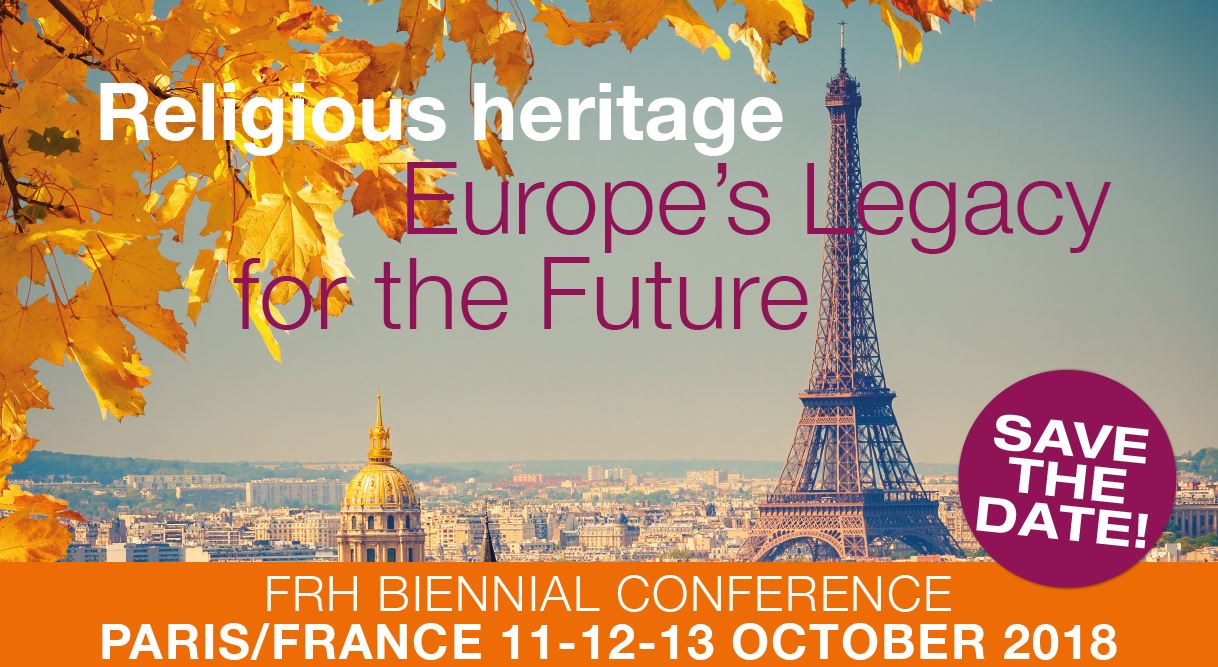FRH Conference 2018: Religious Heritage – Europe’s Legacy for the Future

Download press release in English
Télécharger le communiqué de presse en Français
PRESS RELEASE
FRH Conference 2018
Religious Heritage – Europe’s Legacy for the Future
Should unused religious building be left to crumble? Should churches charge an entrance fee? Are public policies supporting private conservation initiatives? Why should citizens care about their heritage? These and other pressing issues will be addressed while examining the future for religious heritage in Europe.
Who: Future for Religious Heritage (FRH)/ non-profit, non-religious organisation, public and private institutions, EU institutions, academics, experts in the field of religious and cultural heritage
What: FRH Biennial conference
When: From 11-13 October 2018
Where: UNESCO, 7 Place de Fontenoy, 75007 Paris, France
Why:
Europe’s religious heritage – the 500,000 buildings themselves, churches, chapels, synagogues, mosques, cathedrals, monasteries, convents; their contents, furnishings, monuments, sculptures, paintings, frescos, libraries; the architects, artists and musicians they have inspired over the centuries: their record of national, local and individual history dating back more than 1,000 years – are unique to Europe’s cultural identity.
This exceptional patrimony is facing unprecedented threats due to changing patterns in society, worship and population.
The FRH Biennial Conference, in Paris, France, from 11th to 13th October 2018, aims to stimulate a real debate on the future of these magnificent buildings and to discuss the steps to be taken to adapt them to the constraints of the twenty-first century and hand them on intact to future generations.
The conference will examine the challenges and opportunities for engaging the public, focusing on issues such as ownership and the encounter between the religious and the secular. It will address the case of sustainability for religious heritage through the promotion of its social, cultural, economic and environmental values, along with extended use and tourism. It will underline the importance of protection notably through effective maintenance, defence against theft and unnecessary closure. It will explore best practices from other heritage sectors, the use of volunteer support, community-building and the need for education. Finally, the importance of innovation will be discussed, particularly in governance and marketing and effective adaptation to the digital era.
SPEAKERS
Leading experts from the public sector, private sector, European institutions, UNESCO, academia and civil society organisations will be addressing the conference, including distinguished participants including Tibor Navracsics, EU Commissioner for Education, Culture, Youth and Sport, Daniel Janicot, President of the French National Commission at the UNESCO and Sir Simon Jenkins, author and newspapers columnist.
Religious heritage represents by far the largest single category of European cultural patrimony and, according to a poll conducted by FRH (www.frh-europe.org/surveys), is one to which Europeans remain highly attached. Places of worship already attract large numbers of visitors, but the potential of the treasures held in smaller religious sites, both urban and rural, and which constitute ‘Europe’s Biggest Museum’ are still largely underexploited.
Technology adds economic value to the heritage sector: digitised resources can be used to enhance visitor experience by providing educational content, documentaries, and tourism apps. FRH is developing Religiana, an online tool that provides practical background information about religious buildings to a wide audience and to a single international standard. This will be showcased at the FRH Conference.
2018 is the European Year of Cultural Heritage, a key year for heritage. FRH is proud to be a Creative Europe partner in promoting the values and goals of the EYCH2018, ensuring they transcend this year and leave a lasting legacy for cultural and religious heritage in Europe. FRH initiatives include the Torch of Heritage and Culture, a memory treasure box, containing personal letters from prominent members of the international community and from European citizens themselves. These letters describe personal testimonies relating to religious heritage. FRH calls for participation, every contribution is equally important. These can come in many forms, personal experiences, memories, drawings or photographs, and should be registered on line or placed physically in boxes across Europe. The Torch closing ceremony will take place during the first day of the conference when the letters will be presented to Tibor Navracsics, EU Commissioner for Education, Culture, Youth and Sport. Other initiatives include the PhotoWalk and Summer Photo Competition, where citizens can share their appreciation for their religious buildings, artefacts and events.
The conference is organized by FRH, in cooperation with the French National Commission for UNESCO, and has the patronage of the French Ministry of Culture, The Belgian Francophone and Germanophone Commission for UNESCO, the Flemish Commission for UNESCO, the foundation La Sauvegarde de l’Art Français and the PRERICO committee. The conference is co-funded by the Creative Europe Programme of the European Union.
How?
FOLLOW US ONLINE AND ON SOCIAL NETWORKS
Visit the conference website to learn more, and join the conversation on Twitter, LinkedIn and Facebook.
Conference Eventbrite registration page: HERE
ENDS:
For further information please contact: Jordi Mallarach – FRH Communications officer at +32 471 663 736
About FRH (www.frh-europe.org)
Future for Religious Heritage (FRH) brings together those who work to protect religious heritage across Europe. FRH is a non-profit, non-religious organisation founded in 2011 and based in Brussels. As the only European Network for Historic Places of Worship, FRH is a leading voice for the sector. FRH has 154 members in 38 countries, including NGOs, charities, government, religious and university departments. FRH is one of the 28 European networks currently supported by the Creative Europe Networks programme.





Follow us: